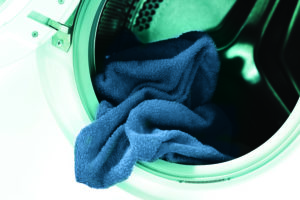
By John Goetz, Global Product Manager, Hydro Systems
Last week we explored different types of laundries and their benefits in part one of this article. This week we will conclude with the benefits of incorporating laundry dispensers in your facility and what to look for in your laundry chemical dispenser.
Laundry dispensers accurately dose a variety of chemicals for on-premise or industrial laundries. This results in:
* Consistently clean linen. No business wants its linen to come out of the wash with stains and potentially make it into the hands of its guests and customers. With a dispenser, the precise amount of chemical is delivered during the wash cycle to thoroughly remove stains.
* Cost savings. Because the chemical proportions are spot on, dispensers help to reduce rewash rates. Rewash cycles require additional labor, energy, chemical and water and can even lead to premature linen replacement. Each of these factors drives up costs for laundry operators.
* Increased productivity. Dispensing systems allow employees to be more productive because they take the place of tedious manual tasks like chemical measuring and mixing. Also, because the wash process is completed correctly the first time, this saves workers from needing to reload washers for a second cycle.
* Safety. Exposure to chemical fumes, or chemical spills and burns, can create a hazardous working environment for employees. With dispensers installed, employees no longer have to come into contact with potentially dangerous chemicals that can result in skin, eye or respiratory injuries and days away from work.
* Sustainability. Even with the safest chemicals, it’s still better for our planet if we use less of them. By dispensing the right amount of chemical each and every time, dispensing systems eliminate the overuse or underuse of product.
When in the market for a dispenser, it’s important to look for one that:
* Remains accurate and reliable over the life of the install. Dispensers that utilize eductors or diaphragm pumps do not require squeeze tubes. Squeeze tubes wear out over time and must be maintained to avoid inconsistent dosing. If peristaltic pumps are utilized, look for units with robust AC or DC motors that are durable and have at least a five-year duty cycle.
* Is sized appropriately for the application. OPL accounts tend to have a few (between one to five) smaller washers (150 pounds or less in size). Therefore, a smaller one-to-one dispenser tends to be the economically viable solution. In industrial accounts, five to 10 larger washers and tunnel washers are not uncommon. For this environment, an industrial central dosing system is the best fit. These systems handle all the injections for the entire facility, consolidate reporting and precisely measure and record each dose.
* Reduces water consumption. Dispensers that limit the amount of water delivered to the washer reduce utility costs. Eductor-based dispensers for OPLs achieve this by restricting the water flow while flushing. Central dosing units for industrial accounts can be equipped with an air flush to limit water usage and speed chemical delivery to the washer.
* Provides key reporting detail. In order for laundries to operate effectively and efficiently, they need access to information about production, chemical usage, costs, and the number of triggered alarms. Look for dispensers that report on these factors in a simple and easy-to-understand format. With this knowledge at hand, laundry managers can take note of patterns and identify abnormalities and areas for improvement.
In-House Success
Sometimes organizations start with one approach to their laundry program and transition to a different setup. In the case of the Northern Quest Resort and Casino (NQRC) in Spokane, Wash., the laundry program was originally handled by a third party.3 To maintain more control over the process, the casino brought its laundry in-house and has since realized several benefits.
NQRC operates a spa and 14 restaurants and lounges, along with 250 guest rooms. The casino made the transition to improve the quality of their luxury linens and exceed guest expectations. The new arrangement also helps minimize damage that can lead to more frequent linen replacement, as the equipment has been built to prevent fabric from tearing. Having an OPL also reduced the wait time for clean linen because the equipment is on site and has shorter cycle times. With energy-efficient washer-extractors and dryers, along with less frequent damage to the 350-thread count sheets and other laundry items, NQRC can reduce costs associated with its laundry program while maintaining guest satisfaction.
The Final Decision
There is no “right answer” when it comes to which approach to laundry is better. Every business must consider its unique needs and examine the tradeoffs associated with each type of program.
While cost is an important consideration, it’s important to realize that the cheapest price doesn’t necessarily equate to it being the best deal. According to expert Richard Neale of LTC Worldwide, “There are serious financial savings to be had by investing in the right equipment, with the latest technology helping to reduce energy and water consumption in the long term.”
Surprisingly, some operators may decide to utilize both approaches. For instance, some sites have an OPL to deal with towels, but leave their bed and restaurant linen to a professional laundry that is capable of maintaining the high standard of ironing required by hotels.
Whether a facility decides to operate an OPL or outsources laundry to a qualified provider, it’s important to make sure that reliable and accurate dispensing equipment is being utilized to ensure great wash results and better manage costs and water and chemical use.
About the Author
John Goetz is global product manager at Hydro Systems. Hydro Systems is an independent manufacturer of chemical injecting, proportioning, dispensing and medicating equipment. Goetz can be reached at jgoetz@hydrosystemsco.com.














